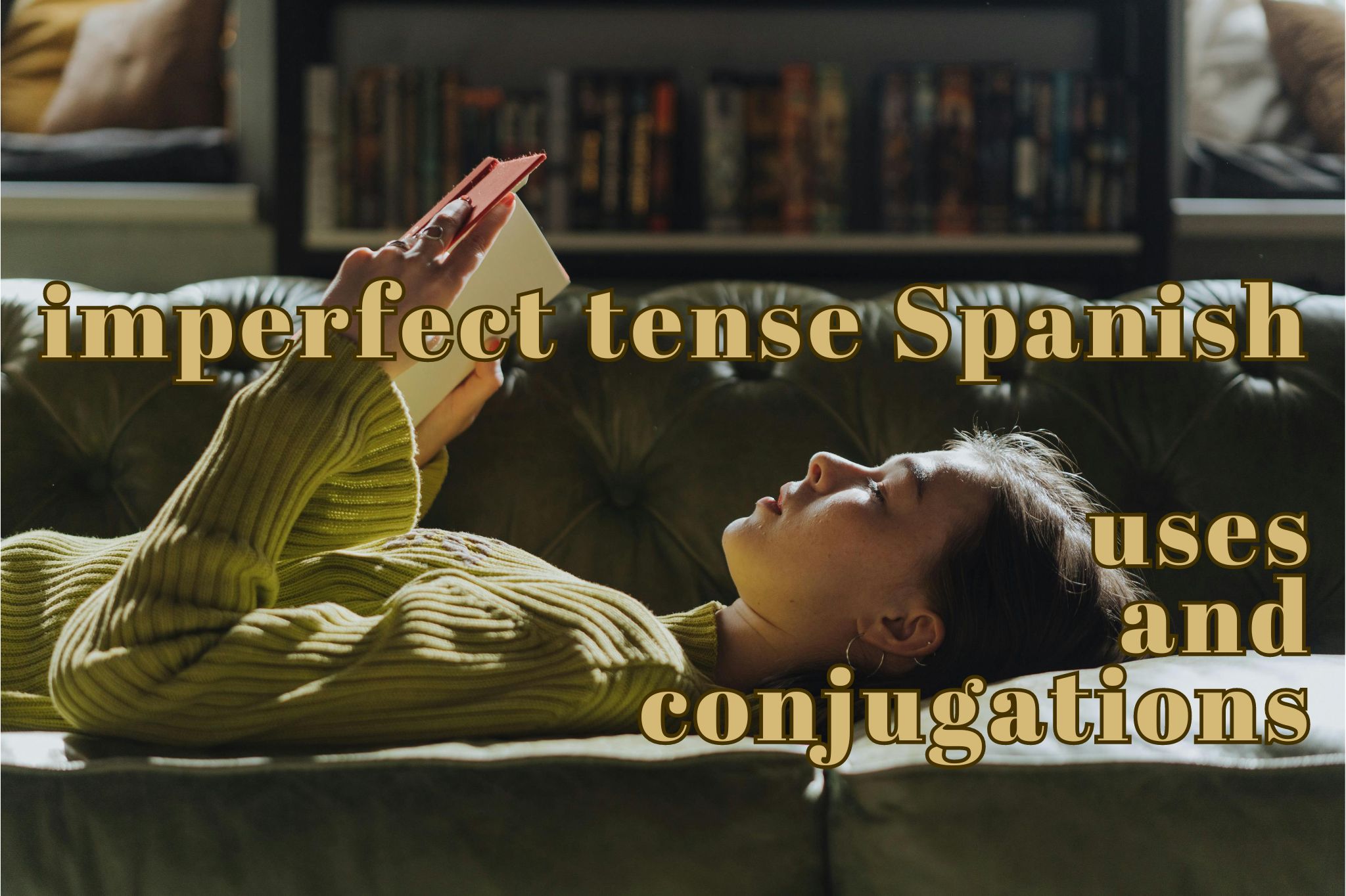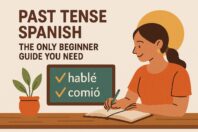Imperfect Tense Spanish: Uses and Conjugations

Get our free email course, Shortcut to Conversational.
Have conversations faster, understand people when they speak fast, and other tested tips to learn faster.
More infoIt’s normal for the imperfect tense to cause confusion for anyone learning Spanish. After all, there are several different ways to speak about the past in Spanish, and knowing how to use each one takes some getting used to.
So if you’re struggling with this tense, you’re in the right place! In this post, we are going to simplify the Spanish imperfect tense for you to use it confidently and never confuse it again.
In this post, we will be focusing solely on imperfect tense Spanish. For other ways to talk about the past, we recommend our post on the different past tenses in Spanish, as well as our anti-confusion to Preterite vs Imperfect past.
Now let’s get to it!
When To Use Imperfect Tense Spanish
Imperfect past tense Spanish is used to talk about past actions, conditions, or events that occurred habitually. It can also be used to describe a past action that perhaps was in progress, and it’s unclear whether the action was completed or not.
Before getting into its uses and examples, note that the imperfect tense in Spanish does not necessarily have a direct translation to English. With this in mind, you’ll notice in our examples that, depending on the context, the direct translation into English may vary between the simple past or the past progressive.
Now, let’s take a deep look at when to use imperfect Spanish, with plenty of examples, providing a clearer picture of imperfect tense Spanish.
Habits in the past
When we say habitual, we’re referring to an action that happened several times in the past to the point that it became routine-like. The closest English equivalent to this would be when you describe a past action that used to be done.
- I used to study on Saturdays. – Yo estudiaba los sábados.
- We used to travel to Honduras every summer. – Nosotros viajábamos a Honduras cada verano.
- My school friends and I ate pizza every weekend. – Mis amigos de la escuela y yo comíamos pizza todos los fines de semana.
As you may have noticed, if the timing of the past action is described using words like every Saturday or every weekend, we need to use imperfect tense Spanish.
Continued actions in the past
The imperfect tense in Spanish is also used when talking about past actions that were continuous for an unspecified period of time, where we don’t know if they were finished or not.
- She read a lot as a child. – Leía mucho cuando era niña.
- Your brother played football with his friends a lot in that park. – Tu hermano jugaba mucho al fútbol con sus amigos en ese parque.
- My grandmother had a duck pond on the farm. – Mi abuela tenía un estanque de patos en la granja.
This use of the imperfect past tense in Spanish can be triggered by timing words like a lot, for a long time, or for a while.
Actions that were in progress in the past
We use the imperfect tense Spanish to talk about a past action that was underway as we describe it, but that was then interrupted by another action. The other action is expressed in the simple past.
- I was washing the dishes when you arrived – Lavaba los platos cuando llegaste.
- The girl was writing when the teacher opened the door. – La niña escribía cuando el profesor abrió la puerta.
- The young man was walking when it started to rain. – El joven caminaba cuando empezó a llover.
Note that in these sentences, the Spanish imperfect tense is expressed in English with the past progressive.
Descriptions: Characteristics, conditions, and feelings
If you like storytelling, then mastering imperfect tense Spanish is a must. We use this tense to give descriptions about things in the past, particularly when it comes to conveying sensory details like how something looked, sounded, or felt.
- She was tall, had long hair, and deep blue eyes. – Ella era alta, tenía cabello largo y ojos azul profundo.
- The house was white, and had big yellow windows. – La casa era blanca y tenía ventanas amarillas y grandes.
- It was very cold that night, and Julieta was sad. – Hacía mucho frío esa noche y Julieta estaba triste.
Times and dates
In addition to what we saw above for our storytelling, imperfect Spanish is also used to introduce times and dates in the past. In other words, the imperfect is required anytime you need to “set the scene” in a story.
- It was July 19th when that happened, I remember well. – Era 19 de Julio cuando eso pasó, lo recuerdo bien.
- It was already three o’clock in the afternoon when Manuel realized that Maria was not coming to their date. – Eran ya las tres de la tarde cuando Manuel se dio cuenta de que María no vendría a la cita.
For completed actions that occurred at a specific point in the past, however, where the date itself is the main point of the statement, we use the simple past tense.
- He was born on May 2nd. – Él nació el 2 de mayo.
To talk about age
Since a given age of a person spans a long stretch of time, we use the imperfect tense to talk about ages in the past. Remember that, unlike in English where someone was a certain age, in Spanish we use the verb tener to say that someone had that age.
- Back then you were barely 8 years old. – Para ese entonces sólo tenías 8 años.
- In 2011, Pedro was 3 years old and Carlos was 6. – En el 2011, Pedro tenía 3 años y Carlos tenía 6.
- My grandfather was 10 years old the first time he went to Peru. – Mi abuelo tenía 10 años la primera vez que fue a Perú.
Imperfect Tense Conjugations
How do we conjugate the imperfect tense in Spanish? We have good news: there are only two sets of imperfect endings to learn, and there are only three verbs in Spanish with irregular imperfect tense conjugations.
Let’s take a look!
Regular verbs
The imperfect tense conjugations have one set of endings for -ar verbs, and another set of endings for both -er and -ir verbs. Let’s first see our imperfect conjugation chart where we just show the Spanish imperfect endings for all three types of verbs, then we’ll see three sample verbs.
| Subject | -ar verbs | -er verbs | -ir verbs |
| Yo | -aba | -ía | -ía |
| Tú | -abas | -ías | -ías |
| Él, Ella, Usted | -aba | -ía | -ía |
| Vosotros, Vosotras | -abais | -íais | -íais |
| Nosotros, Nosotras | -ábamos | -íamos | -íamos |
| Ellos, Ellas, Ustedes | -aban | -ían | -ían |
Now let’s see these endings applied to three typical Spanish verbs. We’ll use trabajar, entender, and vivir to demonstrate the imperfect conjugations Spanish uses for all -ar, -er, and -ir verbs.
| Subject | trabajar | entender | vivir |
| Yo | trabajaba | entendía | vivía |
| Tú | trabajabas | entendías | vivías |
| Él, Ella, Usted | trabajaba | entendía | vivía |
| Vosotros, Vosotras | trabajabais | entendíais | vivíais |
| Nosotros, Nosotras | trabajábamos | entendíamos | vivíamos |
| Ellos, Ellas, Ustedes | trabajaban | entendían | vivían |
Now let’s see some more examples of imperfect tense conjugations:
- María could not travel by plane when she was a child. – María no podía viajar en avión cuando era niña.
- We had to drive carefully. – Nosotros teníamos que manejar con cuidado.
- I knew a lot about that story. – Yo sabía bastante sobre esa historia.
- Diego didn’t go out when he was younger. – Diego no salía cuando era joven.
- They were really worried about the exam. – Ellas estaban muy preocupadas por el examen.
Irregular verbs
There are only three verbs whose imperfect tense conjugations in Spanish don’t use all the same imperfect endings we just saw above. For ir (to go), ser (to be), and ver (to see), the imperfect tense Spanish conjugation just needs to be memorized:
| Subject | Ir | Ser | Ver |
| Yo | iba | era | veía |
| Tú | ibas | eras | veías |
| Él, Ella, Usted | iba | era | veía |
| Vosotros, Vosotras | ibais | erais | veíais |
| Nosotros, Nosotras | íbamos | éramos | veíamos |
| Ellos, Ellas, Ustedes | iban | eran | veían |
- We were heading to your place when I left my keys inside. – Íbamos a tu casa cuando dejé mis llaves adentro.
- You used to be kind, I don’t know what happened to you. – Tú eras amable, no sé qué te pasó.
- She did not see the difference between them. – Ella no veía la diferencia entre ellos.
- We used to go to the park every night. – Nosotros íbamos al parque todas las noches.
- Patricia and Alfredo were really close to each other. – Patricia y Alfredo eran muy cercanos el uno al otro.
Conclusion
Great job! Now you’re ready to talk about the past using imperfect tense Spanish! Let’s do a quick recap before we go.
Today we learned the contexts and uses of the imperfect tense in Spanish, focusing on the inexact nature of the tense. Then, we covered imperfect tense conjugation patterns, looking at imperfect endings for all three verb families. We also saw full imperfect conjugation charts for the only three irregular verbs in this tense: ir, ser, and ver.
By understanding the right contexts for using imperfect tense Spanish, and by applying its conjugation, you’ll be able to convey past actions with clarity and precision. With consistent practice, the imperfect tense will no longer be a source of confusion, but rather a powerful tool in your Spanish communication arsenal. Keep practicing, and soon it will feel like second nature!
Spanish Imperfect Practice
Now that you’ve gained a solid understanding of the imperfect tense in Spanish, it’s time to put your knowledge to the test! Conjugate the verbs in parentheses in the Spanish imperfect tense, being sure to choose the right conjugation to match the subject of the sentence. The answers and translations are below.
1. Mi mamá siempre ________ (olvidar) las llaves en el auto cuando salía de compras.
2. Claro, todos los veranos nosotros ________ (ir) allí de vacaciones.
3. No me ________ (sentir) muy bien en ese momento, así que llamé a mi mejor amigo.
4. En el colegio, los niños ________ (tener) clase de música los miércoles.
5. ________ (llover) mucho cuando salí de casa.
6. Tu siempre ________ (pagar) la cena cuando ________ (salir) con tus amigos.
7. ________ (ser) las tres de la tarde cuando Luis salió de casa.
8. Para ese entonces ________ (tener) ocho años, ya no recuerdo mucho.
9. Ustedes ________ (hacer) la cena mientras ellos ________ (limpiar) la casa.
10. Vosotras ________ (ser) muy delgadas en aquella época.
Answers
1. Mi mamá siempre olvidaba las llaves en el auto cuando salía de compras. – My mom would always forget her keys in the car when she went shopping.
2. Claro, todos los veranos nosotros íbamos allí de vacaciones. – Sure, every summer we would go there on vacation
3. No me sentía muy bien en ese momento, así que llamé a mi mejor amigo. – I wasn’t feeling very well at the time, so I called my best friend.
4. En el colegio, los niños tenían clase de música los miércoles. – At school, the kids had music class on Wednesdays.
5. Llovía mucho cuando salí de casa. – It was raining a lot when I left the house.
6. Tu siempre pagabas la cena cuando salíamos con tus amigos. – You always paid for dinner when we went out with your friends.
7. Eran las tres de la tarde cuando Luis salió de casa. – It was three o’clock in the afternoon when Luis left the house.
8. Para ese entonces tenía ocho años, ya no recuerdo mucho. – I was eight years old at the time, I don’t remember much anymore.
9. Ustedes hacían la cena mientras ellos limpiaban la casa. – You made dinner while they cleaned the house.
10. Vosotras erais muy delgadas en aquella época. – You girls were very thin at that time.



